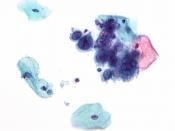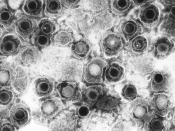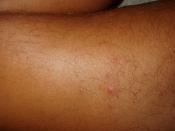What is Genital Herpes?
Genital herpes is a common condition that is easily spread through sexual contact.
Genital herpes is difficult to treat and can cause serious problems for women.
Genital herpes can be prevented by using condoms during sex.
What causes herpes?
Genital herpes is a common sexually transmissible disease (STD). It is caused by infection with one of two kinds of microscopic organisms called herpes simplex virus, types 1 and 2 (HSV-1 and HSV-2). These viruses also cause cold sores on the mouth.
Herpes causes particular problems for pregnant women, since babies can be infected during their passage through the birth canal if HSV is present. This rare occurrence can usually be prevented with careful management.
How do you know if you have genital herpes?
HSV infection sometimes causes no symptoms at all; the body's immune system keeps the virus under control. Usually, infection causes an outbreak of sores in the genital or anal area.
Sores may appear in the following places:
In women, on the vulva or the walls of the vagina, and occasionally in the cervix or around the anus.
In men, usually on the head or the shaft of the penis, but also around the anus.
Before the appearance of sores, there can sometimes be other symptoms. These may include:
General aches and pains and fever (these can occasionally be quite severe, particularly in the first episode).
Depression or moodiness.
Pain, tingling or itching and redness on the affected site.
Usually two to 20 days after the initial infection, herpes sores appear as a cluster of small blisters. After a day or two, these break down into small red ulcers that scab over and heal after a few days. Some people experience only one outbreak, but about half will have recurring episodes.
The extent, severity and length of herpes outbreaks varies from person to person. The usual pattern is for later attacks to be less severe than the initial one, and for attacks to become less frequent over time.
Many people with herpes find outbreaks are linked to events in their lives. These may include:
Stress or depression.
Other infections.
Menstruation.
Heavy alcohol use.
Sunburn.
Friction to the skin, such as sexual intercourse or masturbation, can also trigger outbreaks.
How is herpes spread?
HSV infection may be spread by vaginal, anal or oral sex. Infection comes through direct contact with blisters or ulcers, not necessarily during penetration, so HSV can be spread by any kind of sex. Non-sexual touching of affected areas can also spread infection in some circumstances. Very rarely, herpes can be spread to the eyes or to cuts or abrasions in the skin.
As HSV infection can have serious consequences for women, heterosexual and bisexual men have a particular responsibility not to pass the infection to their female sexual partners. Sexually active men should have regular medical checks for herpes and HSV infection after discussion with their doctor.
How is herpes treated?
There is no treatment for HSV infection as such: once HSV infection has taken place, the virus stays in the body. In recent years, the anti-viral drug acyclovir (trade name Zovirax) has been used to treat herpes. Acyclovir helps relieve the symptoms of severe herpes outbreaks, and may also reduce the frequency and severity of outbreaks for people who suffer from severe or very frequent outbreaks.
For people experiencing milder attacks, some simpler remedies may be effective. These include:
Warm salt baths to clean and soothe ulcers.
Antiseptic or drying agents (to prevent secondary infections of open ulcers).
Standard pain relievers, such as aspirin or paracetamol.
Ice applied directly to sores.
Standard antiseptic creams (though these may delay the healing process by keeping the sores wet).
How can herpes be prevented?
People with herpes are infectious to others during outbreaks; infection results from direct contact with sores or ulcers.
Condoms are an effective barrier against HSV but, depending on their location, may not always prevent contact with sores.
People with herpes will need to discuss their situation with sexual partners so that shared decisions about sex and condom use can be made.
Since sores in the vagina, cervix, urethra or anus may sometimes go undetected, people with HSV infection should always use condoms with uninfected partners. Sexually active women are advised to have Pap smears for HSV at least annually.


